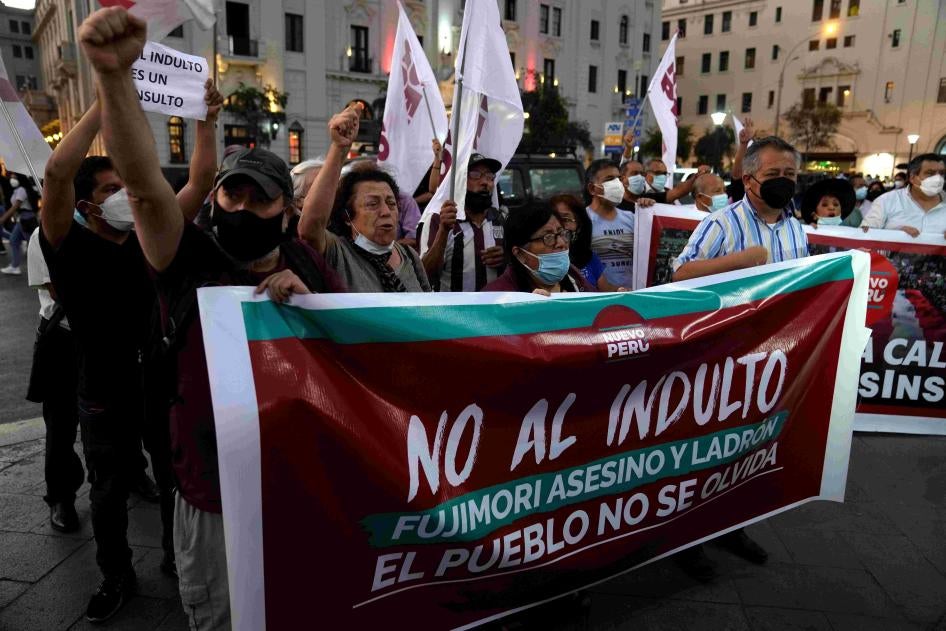(Washington, DC) Peru’s release of the former President Alberto Fujimori violates the country’s international obligations, Human Rights Watch said today. The Inter-American Court of Human Rights should refer the case to the General Assembly of the Organization of American States (OAS).
On December 4, 2023, Peru’s Constitutional Tribunal ordered the release of Fujimori, who was serving a 25-year sentence for his role in extrajudicial killings, abductions, enforced disappearances, and corruption. The tribunal said that Inter-American Court orders not to release Fujimori were not binding. The court responded on December 5, ordering Peru “to refrain from implementing the Constitutional Tribunal’s ruling,” pending a review by the court of the pardon. Yet, the government released Fujimori on December 6.
“Fujimori’s release is a slap in the face to victims of atrocities,” said Juanita Goebertus, Americas Director at Human Rights Watch. “The OAS should examine the release in the context of very serious erosion of the rule of law and the protection of human rights in Peru.”
The December 4 ruling by the Constitutional Tribunal was signed by three justices, and there was a dissenting vote. The two other members of the tribunal said later to reporters that the president of the tribunal did not ask them to participate in the discussion, which was not included in the court’s official agenda. In dissenting votes in a previous ruling on this case, those two justices had said the tribunal had to comply with the orders issued by the Inter-American Court of Human Rights.
Congress appointed the current six members of the tribunal in 2022 in a process that lacked transparency and clear criteria.
The Constitutional Tribunal ruling comes in a context of increasing attacks by Peruvian institutions against the regional human rights system that seek to reduce accountability, and against the rule of law.
Members of Congress have introduced bills recently to denounce the American Convention on Human Rights. In November, President Dina Boluarte appointed a minister of Foreign Affairs who, two months earlier, had also called on Peru to withdraw from the convention.
In addition, Congress appointed an ombudsperson with no human rights experience; removed a top prosecutor without basis; and initiated a summary process to remove the National Board of Justice, which appoints judges, prosecutors, and top electoral officials. Some lawmakers are also seeking to remove the head of the National Elections Tribunal. The attorney general is under investigation for allegedly closing investigations against lawmakers in exchange for votes that benefited her, and she weakened the fight against corruption.
Fujimori was sentenced in 2009 to 25 years in prison for human rights violations, including his role in the extrajudicial execution of 15 people in the Barrios Altos district of Lima, the enforced disappearance and murder of 9 students and a teacher from La Cantuta University, and 2 abductions.
On December 24, 2017, then-President Pedro Pablo Kuczynski granted Fujimori a humanitarian pardon that appeared to be a political maneuver to gain the votes of Fujimori’s supporters in Congress to block impeachment procedures against Kuczynski. Fujimori was released as a result of the pardon.
Granting a humanitarian pardon to Fujimori would be consistent with international human rights law so long as he is not granted special treatment and his release is the result of an independent, thorough, and conclusive medical determination establishing the gravity of his health condition. But Kuczynski’s humanitarian pardon failed to meet these criteria.
In May 2018, the Inter-American Court of Human Rights, which bases its decisions on the American Convention on Human Rights and are binding on Peru, issued an order while monitoring Peru’s compliance with its Barrios Altos and La Cantuta rulings, which had found the Peruvian state responsible for very grave human rights abuses. The court said that there were “serious questions” about the medical and legal basis of the pardon, and the political context in which it was granted. The court requested the state to report on its pending judicial review of the pardon.
In October 2018, a Peruvian court determined the pardon had grave irregularities and was incompatible with Peru’s international obligations. The Supreme Court later confirmed this ruling. Fujimori returned to prison in January 2019.
In March 2022, the Constitutional Tribunal revoked those rulings and ordered Fujimori’s release. But in April, the Inter-American Court of Human Rights responded by ordering Peru “to refrain from implementing the Constitutional Tribunal’s ruling,” as it had not followed international standards when reviewing the humanitarian pardon. Based on that order, Fujimori was not released.
On December 4, 2023, the Constitutional Tribunal upheld its March 2022 ruling and again ordered Fujimori’s release, saying that the Inter-American Court of Human Rights does not have the authority to issue binding orders when it is monitoring whether the state had complied with one of its rulings.
However, the authority of the Inter-American Court of Human Rights is not established by Peru’s Constitutional Tribunal or any other national tribunal, but rather by the Inter-American Court itself, based on its interpretation of the American Convention. The court’s jurisprudence establishes that, based on the American Convention and its own guidelines, orders issued during proceedings to monitor compliance are binding.
“Peru has released Fujimori on the basis of a flawed humanitarian pardon and against the orders of the main human rights court in the Americas,” Goebertus said. “The decision puts Peru together with Nicaragua and Venezuela as countries that defy the Inter-American human rights system. The international community should press the government to comply with its international obligations, including the Inter-American Court’s decisions.”





